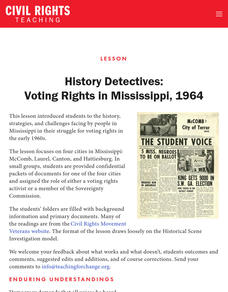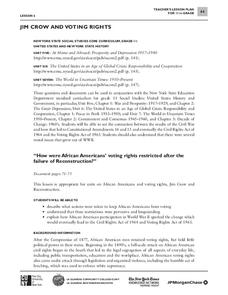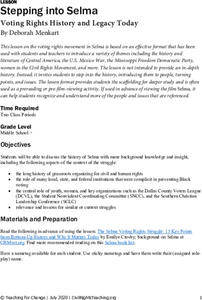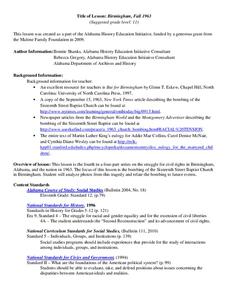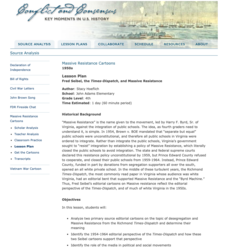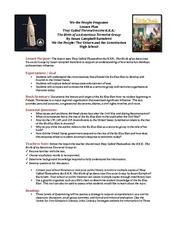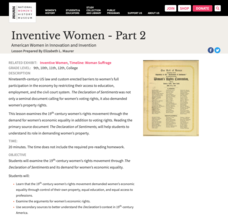Teaching for Change
History Detectives: Voting Rights in Mississippi, 1964
Promises made and promise broken. Spies and activists. Voting rights in Mississippi are the focus of a instructional activity that has class members research the history of the struggle in Mississippi. Learners take on the role of voting...
PBS
Jackie Robinson: Athlete and Activist
Can hitting a home run be an act of courage? Scholars analyze the impact Jackie Robinson had on the Civil Rights movement in America. They use primary sources and video clips to create 21st-Century baseball cards of Robinson's many...
PBS
March on Washington: A Time for Change
Young historians conclude their study of the events that lead up to and the planning for the March on Washington. After examining videos and primary source documents, they consider the civil rights objectives that still need to be...
Curated OER
Martin Luther King and Malcom X on Violence and Integration
Dr. Martin Luther King and Malcolm X were contemporaries. Both were gifted orators, both were preachers, both were leaders during the Civil Rights era, both were assassinated. But the two had very different views on violence and...
K20 LEARN
LBJ and Voting Rights
Challenges to voting rights is not a new thing. Using President Lyndon B. Johnson's 1965 "The American Promise" speech on voting rights as a starting point, young historians research current voting rights laws and challenges.
City University of New York
Jim Crow and Voting Rights
Class groups examine primary source documents to determine how the voting rights of African Americans were restricted after the failure of Reconstruction, and how African American participation in World War II lead to change.
Center for Civic Education
Citizenship Schools and Civic Education During the Civil Rights Movement and in the Present
Your young historians will discover the importance that citizenship education has played in the social progress of the United States as they learn about early efforts to discourage African Americans from voting in the 1960s.
Teaching for Change
Stepping into Selma
The 1964 Selma to Montgomery, Alabama voting rights marches are the focus of a lesson designed to introduce learners to people who took part in the Civil Rights Movement. Class members set into the role of one of the participants,...
Teaching Tolerance
Using Photographs to Teach Social Justice | Confronting Unjust Practices
A powerful photograph of the Freedom Riders of 1961 launches an examination of the de jure and de facto injustices that the civil rights movement of the 1950s and 1960s addressed. Young historians first watch a video and read the Supreme...
PBS
Out of the Shadows | Black America Since MLK: And Still I Rise
Two powerful video clips launch a study of race relations in the United States after the Selma, Alabama riots, the passage of the Votings Rights Act, and the riots in Watts, California.
Museum of Tolerance
Making Lemonade: Responding to Oppression in Empowering Ways
An activity focused on tolerance encourages class members to consider how they might respond when they or someone else is the target of oppression and discrimination. After researching how some key figures responded to the anti-Semitism...
Carolina K-12
African Americans in the United States Congress During Reconstruction
The Civil Rights Act of 1866, which granted citizenship to all males in the U.S., resulted in the first African Americans to be elected to Congress. Class members research 11 of these men, the challenges they faced, and craft...
Alabama Department of Archives and History
Birmingham, Fall 1963
Can any good come from acts of evil? The 1963 bombing of the Sixteenth Street Baptist Church in Birmingham, Alabama, and the eventual outcomes of the tragedy, are the focus of a lesson that asks groups to examine primary source documents...
Anti-Defamation League
Shirley Chisholm: Unbought, Unbossed and Unforgotten
A 13-page packet introduces high schoolers to a lady of amazing firsts. Shirley Chisholm was the first Black woman elected to Congress, the first Black woman to run for President of the United States, and a leader of the Women's Rights...
University of Arkansas
Promises Denied
"Promises Denied," the second instructional activity in a unit that asks learners to consider the responsibilities individuals have to uphold human rights, looks at documents that illustrate the difficulty the US has had trying to live...
Anti-Defamation League
Who Was César Chávez?
Scholars complete a KWL chart to indicate what they know about Cesar Chavez and then research what they want to know about this farm worker, labor leader, and civil rights activist. To complete the lesson, scholars research modern civil...
National Woman's History Museum
Ida B. Wells: Suffragist and Anti-Lynching Activist
Suffragette, investigative journalist, and civil rights activist Ida B. Wells is the focus of a lesson plan that has young historians study the work of this amazing woman. Scholars watch a video biography of Wells, read the text of her...
University of California
The Civil War: Lincoln’s Speeches
Abraham Lincoln is responsible for uniting the states during the most tumultuous periods in American history, and for his elegant oratory that kept the Union believing in its cause. Young histoians analyze various speeches by America's...
PBS
The Black Panthers
Stanley Nelson's acclaimed film, The Black Panthers: Vanguard of the Revolution uses interviews, archival footage, and images to document the story of the radical political party established in 1966 by Huey Newton and Bobby Seale. A...
Roy Rosenzweig Center for History and New Media
Fred Seibel, the Times-Dispatch, and Massive Resistance
A lesson challenges scholars to analyze editorial cartoons created by Fred Seibel, illustrator for the Times-Dispatch, during the Massive Resistance. A class discussion looking at today's editorial pages and Jim Crow Laws leads the way...
K20 LEARN
Plessy v. Ferguson: An Individual's Response to Oppression
After generating research questions rated to segregation, groups are given a primary source document (Jim Crow Laws, Black Codes, Plessy v. Ferguson, etc.) and craft a presentation that details the key elements of their assigned...
School Improvement in Maryland
Immigration Legislation
What is the purpose of immigration legislation? How has this legislation evolved over the years? What are the factors that caused these changes? Class members research immigration legislation to determine whose rights the laws are...
Curated OER
The Called Themselves the K.K.K.; The Birth of an American Terrorist Group
How did Ku Klux Klan develop and flourish in the US? How did the government respond to acts of terrorism conducted by the KKK following the Civil War? How does the government respond to acts of terrorism today? This resource launches a...
National Woman's History Museum
Inventive Women - Part 2
The Declaration of Independence was published in 1776. The Declaration of Sentiments and Resolutions, modeled after the Declaration of Independence, was drafted and read by Elizabeth Cady Stanton at the Seneca Falls Convention in 1848....
Other popular searches
- Civil Rights Act 1964
- Civil Rights Act of 1964
- Civil Rights Activism
- Civil Rights Act 2001
- Civil Rights Act Canada
- Civil Rights Act 1965
- Civil Rights Act 1866
- Civil Rights Act 1968
- Civil Rights Activists
- Civil Rights Act of 1866
- Jewish Civil Rights Activists
- Civil Rights Activities


